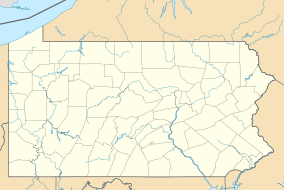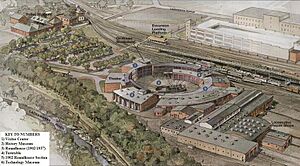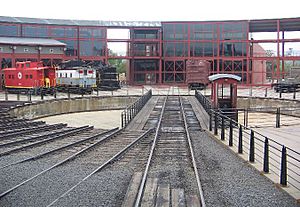Steamtown National Historic Site facts for kids
Quick facts for kids Steamtown National Historic Site |
|
|---|---|
|
IUCN Category III (Natural Monument)
|
|
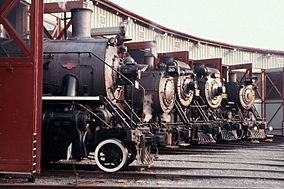
Five locomotives in the roundhouse
|
|
| Location | Scranton, Pennsylvania, U.S. |
| Area | 62.48 acres (25.28 ha) |
| Established | October 30, 1986 |
| Visitors | 106,309 (in 2005) |
| Governing body | National Park Service |
| Website | Steamtown National Historic Site |
Steamtown National Historic Site (NHS) is a cool place where you can explore old trains! It's a railroad museum and a heritage railroad located in Scranton, Pennsylvania. The site covers about 62 acres and used to be the train yards for the Delaware, Lackawanna and Western Railroad (DL&W).
At Steamtown, you'll find a working turntable and a roundhouse. These are like big garages for trains, and they look a lot like the original buildings from the DL&W. Some of the buildings are very old, dating back to the late 1800s and early 1900s. All these historic buildings are part of the National Register of Historic Places.
Most of the amazing steam locomotives and other train equipment at Steamtown NHS were first collected by F. Nelson Blount. He was a rich businessman who loved trains. In 1964, he started a group called the Steamtown Foundation to run a train museum in Bellows Falls, Vermont.
In 1984, the museum moved to Scranton. The city hoped it would bring lots of visitors and help the area. However, not as many people came as expected, and the museum faced money problems.
In 1986, the U.S. government stepped in. A local representative, Joseph M. McDade, helped get money to turn the museum into a National Historic Site. Some people thought the train collection wasn't special enough, but others believed it showed an important part of American history. By 1995, the National Park Service (NPS) took over Steamtown, USA, and made it even better.
Since then, Steamtown National Historic Site has traded some trains and added others that are more important to the history of the region.
Contents
Exploring the Museum and Train Collection
Steamtown NHS is built inside a real, working railroad yard. You can see parts of the old 1902 DL&W Scranton roundhouse and train repair shops. The visitor center, theater, and museums are designed to look like the original roundhouse, giving you a sense of what it was like.
The museum has cool exhibits about the history of steam railroads in the United States, especially in Pennsylvania. You can learn about how trains worked, what life was like for railroad workers, and how railroads affected business and government. There's also a short film playing all day.
You'll see many different types of trains, including powerful locomotives and passenger cars. Some trains let you climb inside the driver's cab or walk through different compartments. You can explore a mail car, a fancy passenger car for railroad bosses (with a dining room and sleeping areas), a boxcar, and two cabooses. There's even a recreated DL&W station with a ticket window. A special steam locomotive with parts cut away helps you understand how steam power works. You can also see an old inspection pit from 1865 preserved under glass.
Some of the trains have a special connection to the Scranton site, like a DL&W steam engine and a diesel engine. Other famous trains include the huge Union Pacific Big Boy #4012, the rare Canadian Pacific Railway (CP Rail) #2929, and the Reading Company (RDG) T-1 #2124.
Train Equipment at Steamtown
Locomotives on Display
| Number | Image | Type | Builder | Built | Status | Notes |
|---|---|---|---|---|---|---|
| 1 | 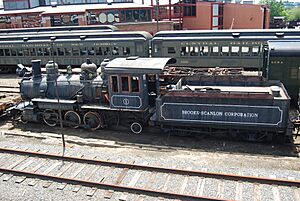 |
2-6-2 | Baldwin Locomotive Works | 1914 | Display | |
| 1 | 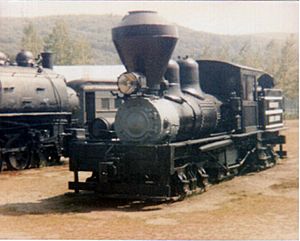 |
Class B Shay | Lima Locomotive Works | 1910 | Under restoration | Damaged in 1983. |
| 2 | 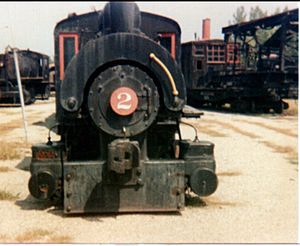 |
0-4-0T | H.K. Porter, Inc. | 1937 | Undergoing cosmetic restoration | The smallest locomotive in the collection. |
| 3 | 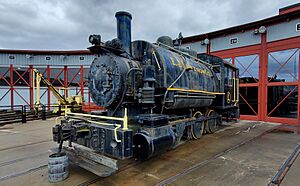 |
0-6-0T | American Locomotive Company | 1927 | Display | |
| 7 | 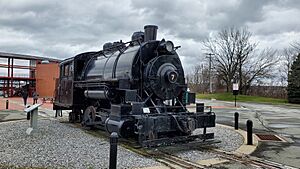 |
2-4-2T | Vulcan Iron Works | 1911 | Display | |
| 8 | 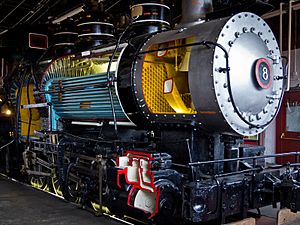 |
0-6-0 | Baldwin Locomotive Works | 1923 | Display | Used on a tourist railroad from 1964 to 1966. |
| 15 | 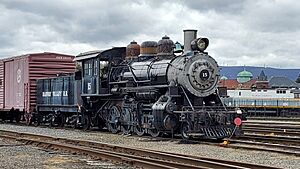 |
2-8-0 | Baldwin Locomotive Works | 1916 | Display | Originally built for the Oneida and Western Railroad. |
| 26 | 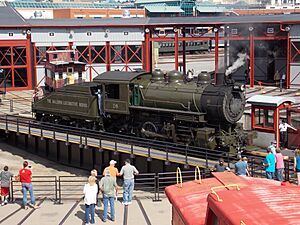 |
0-6-0 | Baldwin Locomotive Works | 1929 | Operational | Runs short excursion trains. |
| 43 | 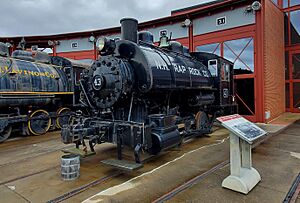 |
0-4-0T | Vulcan Iron Works | 1919 | Display | |
| 44 | 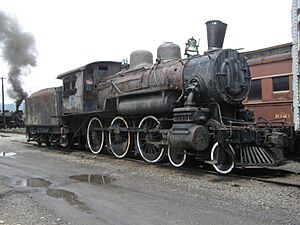 |
4-6-0 | Brooks Locomotive Works | 1905 | Display, awaiting possible cosmetic restoration | The oldest surviving Nickel Plate Road locomotive. |
| 47 | 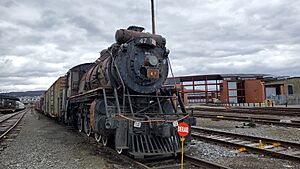 |
4-6-4T | Montreal Locomotive Works | 1914 | Display, awaiting possible cosmetic restoration | The first steam locomotive to pull trips at Steamtown in Vermont. |
| 132 | Wabash Railroad | SW-8 | 1953 | Display | Painted as Lackawanna No. 500. | |
| 210 | 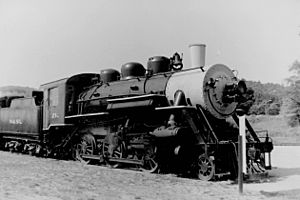 |
2-6-0 | American Locomotive Company | 1923 | Display | |
| 504/506 | 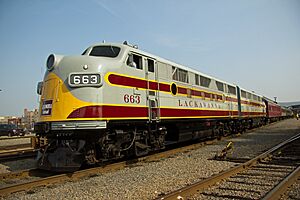 |
EMD F3 | Electro-Motive Division | 1948 | Operational | Repainted as Lackawanna 663 and 664. Operates excursion trains. |
| 514 | 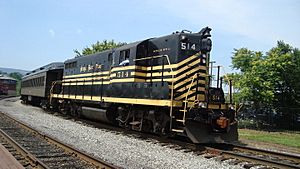 |
GP-9 | Electro-Motive Division | 1958 | Operational | Operates excursion trains from Scranton. |
| 519 | 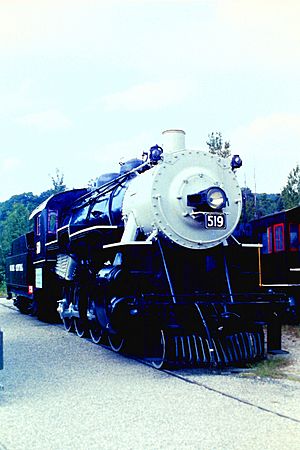 |
2-8-0 | American Locomotive Company | 1913 | Display, awaiting possible cosmetic restoration | |
| 565 | 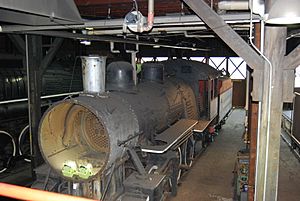 |
2-6-0 | American Locomotive Company | 1908 | Display | The only DL&W locomotive in the collection. |
| 759 | 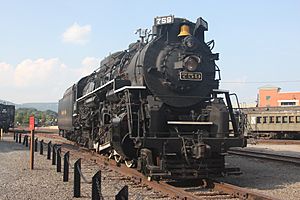 |
2-8-4 | Lima Locomotive Works | 1944 | Display | Used for special trips between 1968 and 1973. |
| 790 | 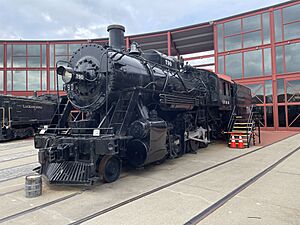 |
2-8-0 | American Locomotive Company | 1903 | Display | The oldest locomotive in the collection. |
| 1901 | SW-1 | Electro-Motive Division | 1939 | Undergoing overhaul | ||
| 1923 | 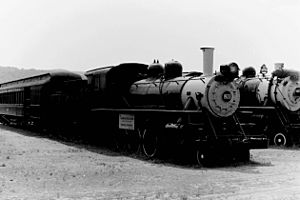 |
2-8-0 | American Locomotive Company | 1920 | Display | Built for a company in Cuba but never delivered. |
| 2124 | 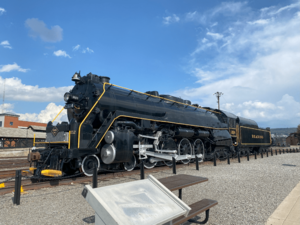 |
4-8-4 | Reading Shops | 1947 | Display | Built from an older Reading locomotive. |
| 2317 | 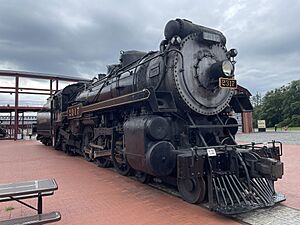 |
4-6-2 | Montreal Locomotive Works | 1923 | Display | Operated special trips from 1978 to 2010. |
| 2505 | (B-B) | Pullman | 1930 | Display | The only electric train in the collection. | |
| 2929 | 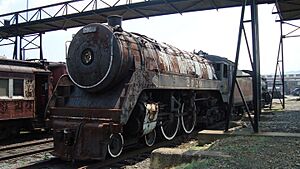 |
4-4-4 | Canadian Locomotive Company | 1936 | Display, awaiting possible cosmetic restoration | The only streamlined steam locomotive in the collection. |
| 3254 | 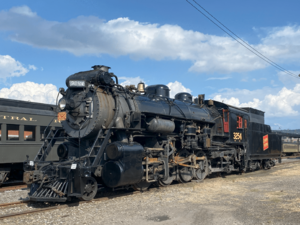 |
2-8-2 | Canadian Locomotive Company | 1917 | Display | Operated special trips from 1987 to 2012. |
| 3377 | 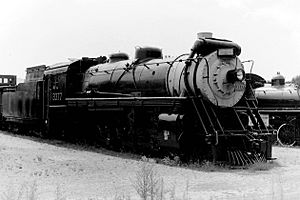 |
2-8-2 | Canadian Locomotive Company | 1919 | Display, awaiting possible restoration | Used for spare parts for No. 3254. |
| 3713 | 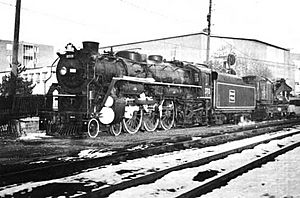 |
4-6-2 | Lima Locomotive Works | 1934 | Under restoration | Named the "Constitution". |
| 4012 | 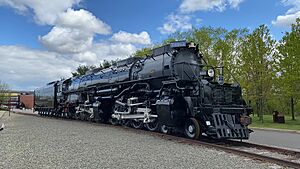 |
4-8-8-4 | American Locomotive Company | 1941 | Display | The largest locomotive in the collection. |
| 6039 | 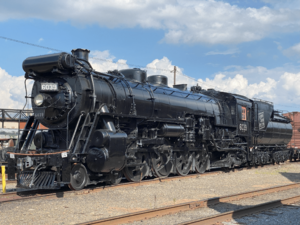 |
4-8-2 | Baldwin Locomotive Works | 1925 | Display | The only "Mountain" type locomotive in the collection. |
| 6816 | 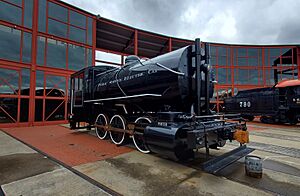 |
0-6-0F | H.K. Porter Inc. | 1923 | Display | The only fireless locomotive in the collection. |
Trains That Used to Be Here
| Number | Image | Heritage | Type | Builder | Notes |
|---|---|---|---|---|---|
| 2816 | 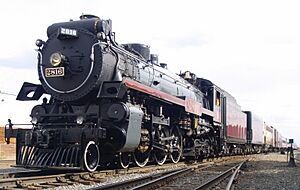 |
Canadian Pacific Railway | Steam | Canadian Locomotive Company | Sold to CP Rail and operated special trips until 2012. It started running again in 2023. |
| 1293 | 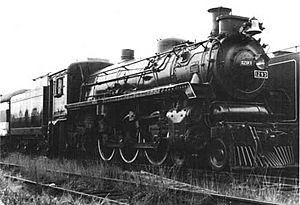 |
Canadian Pacific Railway | Steam | Canadian Locomotive Company | Sold to Jerry Joe Jacobson for the Ohio Central Railroad System. Now on display at the Age of Steam Roundhouse. |
| 1278 | 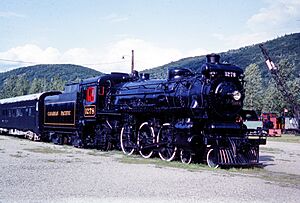 |
Canadian Pacific Railway | Steam | Canadian Locomotive Company | Traded to another railroad. Now on display at the Age of Steam Roundhouse. |
| 1246 | 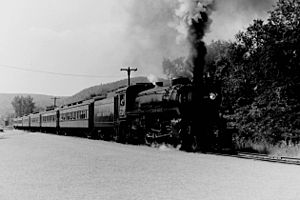 |
Canadian Pacific Railway | Steam | Montreal Locomotive Works | Sold at an auction in 1988 to the Valley Railroad. Now on display at the Railroad Museum of New England. |
| 1098 | 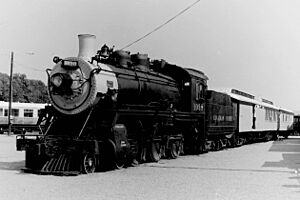 |
Canadian Pacific Railway | Steam | Canadian Locomotive Company | Sold in 1987. Now on display at the Reading Blue Mountain and Northern Railroad. |
| 1218 | 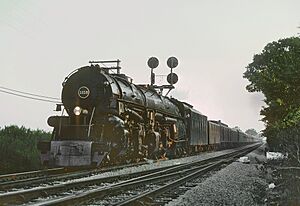 |
Norfolk and Western Railway | Steam | Norfolk and Western’s Roanoke Shops | Traded to the Norfolk Southern Railway and operated special trips from 1987 to 1991. Now on display at the Virginia Museum of Transportation. |
| 1395 | 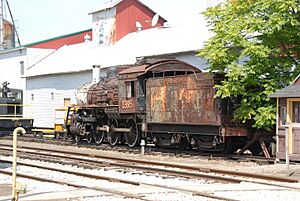 |
Canadian National Railway | Steam | Montreal Locomotive Works | Sold at an auction in 1988. It is currently stored, waiting for cosmetic restoration. |
| 1551 | 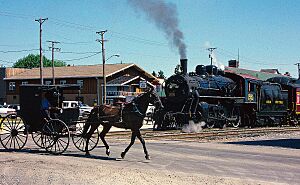 |
Canadian National Railway | Steam | Montreal Locomotive Works | Traded for another locomotive. It was the first steam locomotive to pull trains on the Ohio Central Railroad System. It now lives at the Age of Steam Roundhouse. |
| 5288 | 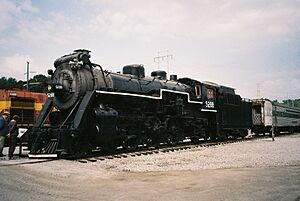 |
Canadian National Railway | Steam | Montreal Locomotive Works | Purchased by the Tennessee Valley Railroad Museum in 2001. Ownership was transferred to the Colebrookdale Railroad in 2023. |
| 1361 | 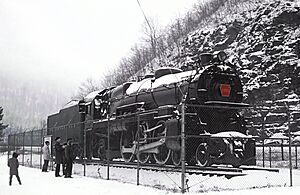 |
Pennsylvania Railroad | Steam | PRR Juniata Shops | Moved to Scranton in 1996 for restoration, but the plan was canceled in 2010. It is currently undergoing a third restoration attempt. |
Fun Activities and Train Rides
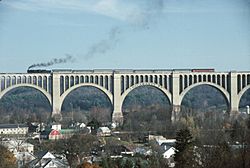
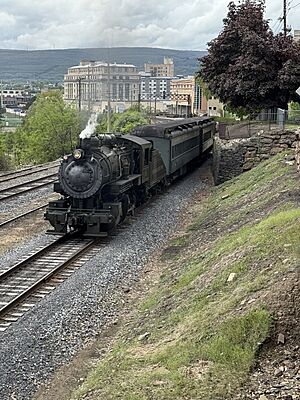
Steamtown NHS offers many ways to experience how railroads worked long ago. Park rangers lead tours of the locomotive shop, where you can see real work being done on the steam engines. You can also see the giant Union Pacific Big Boy locomotive and watch demonstrations of the turntable. Rangers also share stories about Steamtown's history. The Scranton train yard is quite large, covering about 40 acres.
Throughout spring, summer, and fall, several working locomotives take visitors on short rides around the Scranton yard. Most rides are in passenger cars, but you can also try caboose and handcar rides. Longer trips to nearby towns like Carbondale, Moscow, and Delaware Water Gap are also available with separate tickets.
The Story of Steamtown
How It Started in New England
F. Nelson Blount loved trains. He collected many old steam locomotives from the U.S. and Canada. By 1964, he had a huge collection in North Walpole, New Hampshire. He started a group called the "Steamtown Foundation" to run a museum called Steamtown, USA in Bellows Falls, Vermont.
Sadly, Blount died in a plane crash in 1967. His collection was then managed by the Steamtown Foundation. Over time, the museum in Vermont faced problems. It was in a remote location, and the steam trains caused pollution, which was against state rules. By 1978, the foundation started looking for a new home for Steamtown, USA.
The National Park Service explains that Steamtown National Historic Site was created to save the history of steam railroading in America, focusing on the years 1850 to 1950. It's not just about the old Steamtown USA, but about the bigger story of how trains helped build America.
Moving to Scranton, Pennsylvania
A newspaper writer named Michael McManus suggested that a city like Scranton could benefit from a tourist attraction like Steamtown. He explained why the museum was struggling in Vermont, mentioning its isolated location and damage to some trains from a collapsed roof.
In June 1983, Scranton decided to take on Steamtown. The city promised to raise money to move the many old steam engines and cars. On October 23, 1983, Steamtown had its last train ride in Vermont, and the big move to Pennsylvania began.
Scranton hoped the museum would bring hundreds of thousands of visitors each year. The city even spent a lot of money to turn the old DL&W train station into a hotel. However, only about 60,000 visitors came in 1987, and the museum quickly fell into debt. One problem was the high cost of fixing up the new site and the old trains. Also, the train rides from Scranton passed through a large junkyard, which wasn't very scenic.
Becoming a National Historic Site
In 1986, U.S. Representative Joseph M. McDade from Scranton helped get $8 million to study the train collection and make Steamtown a National Historic Site. The National Park Service (NPS) then studied each piece of equipment to see if it was historically important to the U.S. Many trains that didn't fit this goal were sold or traded for more relevant ones.
Making Steamtown a federal project caused some debate. Some people thought the collection wasn't important enough and that the government shouldn't spend so much money on it. They argued that other national parks needed funding more. However, supporters, like former Pennsylvania governor William W. Scranton, argued that Steamtown was a unique place to learn about America's Industrial Revolution. They pointed out that Scranton had many historical buildings and a working train yard, making it perfect for showing how steam locomotives helped connect the nation.
Despite the arguments, Congress voted to continue funding the project. By 1994, even some who were originally doubtful started to see the value of Steamtown. They believed it would be a special place to experience mainline steam railroading.
Operating as a National Historic Site
By 1995, the NPS had finished developing Steamtown at a total cost of $66 million. The grand opening was in June 1995. In November 1995, a writer for The New York Times gave the park a good review, saying it was fun to see the trains moving around the roundhouse. In its first year, 212,000 people visited.
By 2008, the government had spent a lot more on Steamtown. Visitor numbers went down for a while but then went back up to 111,000 in 2011. In 2021, Steamtown finished a big, two-year project to restore its largest engine, the Union Pacific Big Boy #4012.
On January 19, 2025, Jeremy M. Komasz was chosen as the new superintendent for Steamtown.
Train Incidents
On July 10, 1995, shortly after the museum opened, two teenage boys were sadly hit by a Steamtown train. They were trying to move their vehicle from the tracks.
On October 27, 2003, a train was going through the Poconos when some of its cars went off the tracks. Luckily, no one was hurt because the train was moving slowly.
See also
- Edaville Railroad
- Lackawanna Cut-Off
- List of heritage railways


